John Milton was arguably one of the greatest writers in the English language. He also was a noted historian, scholar, pamphleteer, and civil servant.
Milton ranks along with William Shakespeare among English poets; his writings and his influence are an important part of the history of English literature, culture, and thought. He is best known for Paradise Lost, which is generally regarded, as he intended, the greatest epic poem in the English language. Milton’s prose works, however, deserve their place in modern histories of political and religious thought.
According to one biographer, Milton “was loved by many, hated by some, but ignored by few.” How did John Milton come to have such influence? What made his last work—On Christian Doctrine—so controversial that it remained unpublished for 150 years? (John Milton: A Biography)
(John Milton: A Biography)
John Milton was born into a financially secure London family in 1608. “My father destined me in early childhood for the study of literature, for which I had so keen an appetite that from my twelfth year scarcely ever did I leave my studies for my bed before the hour of midnight,” Milton recalled. He excelled scholastically and received a master’s degree at Cambridge in 1632. Thereafter, he continued to read history and classical literature. By his own account, his early enthusiasm for the sensual poetry of Ovid and other Roman writers gave way to an appreciation of the idealism of Dante, Petrarch, and Edmund Spenser. He then moved on to Platonic philosophy and finally came to hold the biblical Book of Revelation in the highest esteem. Milton’s scholarly and literary gifts had from childhood marked him out in the minds of his family and teachers for the ministry, however Milton wanted to be a poet. England in his day was in the throes of revolution. Parliament, led by Oliver Cromwell, appointed a court that had King Charles I executed in 1649. Using persuasive prose, Milton defended this action and became a spokesman for the Cromwell government. In fact, before attaining fame as a poet, John Milton was already well-known for his tracts on politics and morals..






 Dr. Mercola is the founder of the world’s most visited natural health web site,
Dr. Mercola is the founder of the world’s most visited natural health web site,





